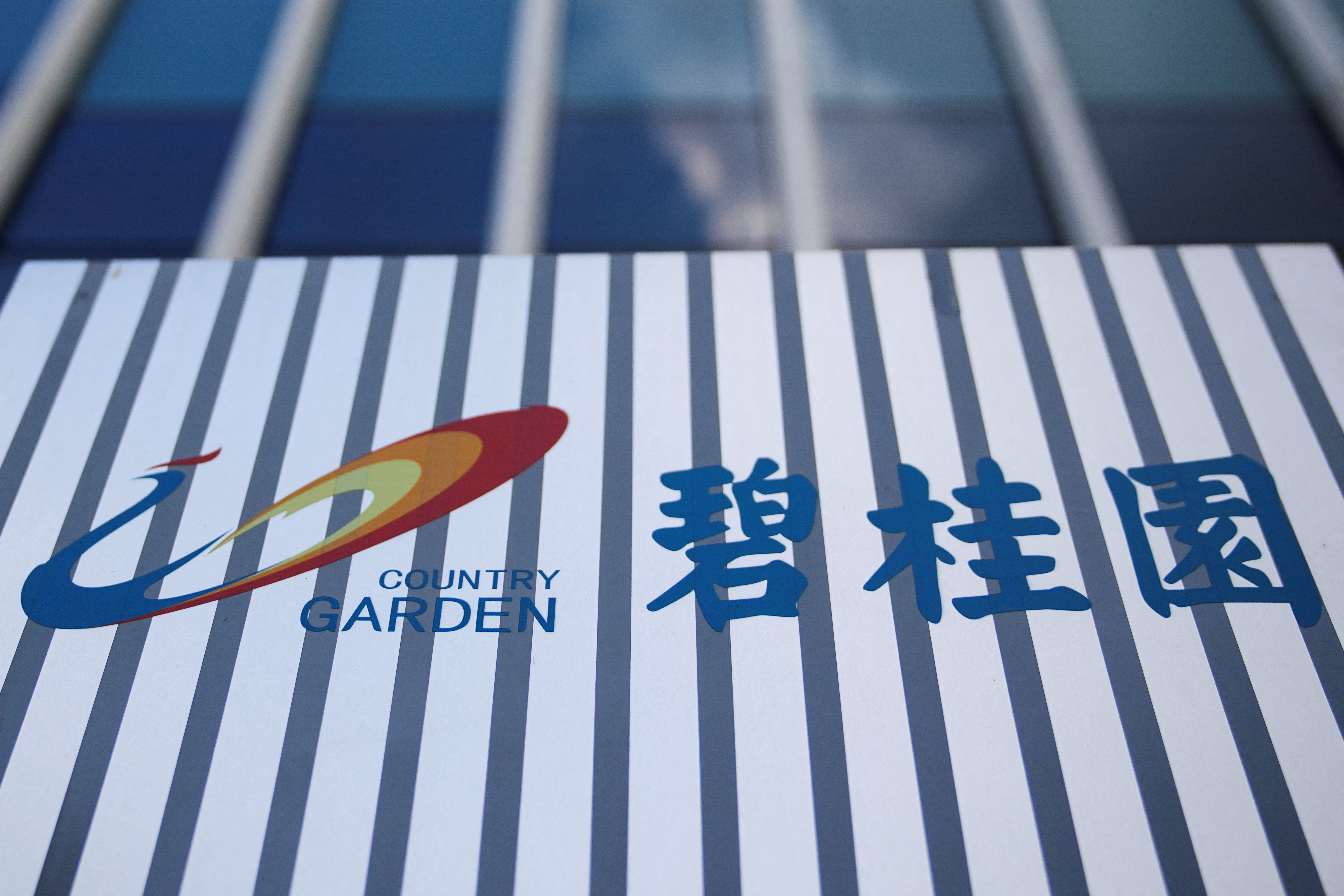[ad_1]

The company logo of Chinese developer Country Garden is pictured at the Shanghai Country Garden Center in Shanghai, China August 9, 2023. REUTERS/Aly Song/File Photo
HONG KONG/BEIJING, Aug 14 (Reuters) – China’s largest private real estate developer Country Garden (2007.HK) is seeking to delay payment on a private onshore bond for the first time, the latest sign of a stifling cash crunch in the property sector, piling pressure on Beijing to step in.
Adding to worries about contagion risk, a major Chinese trust company that traditionally had sizable exposure to real estate, Zhongrong International Trust Co, has missed its repayment obligations on some investment products.
Analysts warned that a rise in default by trust companies, also known as shadow banks, which have strong ties to the domestic property sector, will further weigh on the world’s second-largest economy.
Anxiety about contagion risks is spreading through global markets, putting China’s government under mounting pressure to deliver support for the ailing real estate sector, which accounts for roughly a quarter of the economy.
Once considered a more financially sound developer, Country Garden’s woes could also have a chilling effect on homebuyers and financial firms, with more private developers close to a tipping point if Beijing’s support does not materialise soon.
The real estate sector has suffered tumbling sales, tight liquidity and a series of developer defaults since late 2021, with China Evergrande Group (3333.HK) at the centre of the debt crisis.
Weak overseas demand, tepid domestic consumption and persistent problems in the property sector have been major factors in China’s struggles to mount a solid post-COVID recovery.
In a move that dealt a fresh blow to investors’ sentiment, two Chinese listed companies said over the weekend that they had not received payment on maturing investment products from Zhongrong International Trust Co.
Trust firms, or shadow banks, operate outside many of the rules that govern banks, channelling the proceeds of wealth products sold by banks to developers and other sectors that are unable to tap bank funding directly.
Concerns about the outsized exposure of China’s shadow banks – a $3 trillion industry, roughly the size of Britain’s economy – to property developers have grown over the past year as the sector lurched from one crisis to another.
JPMorgan in a research note on Monday said that rising trust defaults would drag down China’s economic growth by 0.3-0.4 percentage points directly, and that it expects a “vicious cycle” of real estate financing challenges.
“In addition to the apparent financial risks and their transmissions, the latest wave of defaults from wealth management firms on trust-related products is likely to cause some substantial ripple effects for the broader economy through wealth effects,” Nomura said in a separate note.
‘CRITICAL MOMENT’
A source with direct knowledge said on Monday that Country Garden has proposed to creditors to extend repayment for an onshore private bond due Sept. 2 , with an outstanding of 3.9 billion yuan, by three years in seven instalments.
Country Garden declined to comment. In separate filings during the weekend, the developer said it would suspend trading in 11 of its onshore bonds from Monday, a move traders said usually signals plans to seek repayment extensions.
In September alone, Country Garden may need to repay more than 9 billion yuan ($1.25 billion) worth of onshore bonds, according to Reuters’ calculations.
The suspension of its onshore bonds followed a report by Chinese media outlet Yicai on Friday that the company was heading for a debt restructuring, after it missed payments of two dollar bond coupons due on Aug. 6 totalling $22.5 million.
The developer’s shares dived 18.4% to HK$0.8 on Monday, dragging down the Hang Seng Mainland Properties Index (.HSMPI) which dropped 3.7%. The stock has lost 50% so far this month.
Country Garden’s offshore bonds also eased, with a few trading at the lower end of 6 cents on the dollar earlier. Most have since firmed slightly.
Its woes are adding to spillover concerns across a property market already grappling with weak buyer demand.
“The problems in the sector have been brewing for a long time, it wiped off the wealth effect among investors and no one wanted to buy property now,” said Dickie Wong, executive director at Kingston Securities.
Wong said the sector’s impact on the economy has reached a “critical moment” and that regulators should implement more policies including further cutting interest rates and reserve ratios.
China’s economy grew at a frail pace in the second quarter as demand weakened at home and abroad, prompting top leaders to promise further policy support and analysts to downgrade their growth forecasts for the year.
State-owned China Jinmao (0817.HK) said in a filing on Sunday it expected to post a 80% decline in net profit in the first half of this year, due to a drop in gross profit margin in some projects and a decrease in land development revenue.
Its Hong Kong-listed shares slumped 4.1% on Monday.
Reporting by Clare Jim in Hong Kong and Shuyan Wang in Beijing; Addition reporting by Yuhan Lin in Beijing and Hongwei Li in Shanghai; Writing by Sumeet Chatterjee; Editing by Jacqueline Wong, Shri Navaratnam, Simon Cameron-Moore and Jan Harvey
Our Standards: The Thomson Reuters Trust Principles.
[ad_2]
Source link
